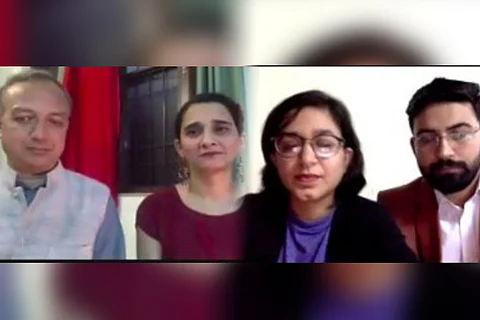

Sadaf and Yatin got married in February 2018, when the “ghar waapsi” (homecoming) and “love jihad” propagandas were being used in many states of India. “Both families were apprehensive about losing their child to another faith. However, they understood us and we got married in a court, without changing our religions. We live with Yatin’s parents because I want them to see me beyond my identity of being a Muslim,” said Sadaf as she opened up about her interfaith marriage, at the Bangalore Literary Festival on Saturday. “We received a lot of support, but it was not a rosy path,” she admits.
The online panel discussion of Bangalore Lit Fest also featured another interfaith couple — Natasha and Afzal. “When my brother was going abroad, my father warned him that he could marry anyone but a Muslim. Then, I met Afzal. Sometimes, he jokes that I married him to rebel against my father. But, today, our families are closer than ever and it was because of their support that we could make our marriage work,” recalled 49-year-old Natasha at the session, which was moderated by Samar Halarnkar, the co-founder of India Love Project, an initiative that celebrates stories of love and marriage outside the bounds of faith, caste, ethnicity and gender.
India Love Project at Bangalore Literature Festival
The recent controversy over Tanshiq’s ad on an interfaith marriage prompted three journalists — Samar, Priya Ramani and Niloufer Venkatraman — to start this initiative on the microblogging site of Instagram.
The couples — Natasha-Afzal and Sadaf-Yatin — shared their stories of interfaith love through the India Love Project. And many couples today connect with such stories of interfaith love and marriage as the bogey of ‘love jihad’ has picked up the pace in India and snowballed into legislations that threaten the union of two adult individuals who are in love with each other.
’Love jihad’ is neither a constitutionally or legally defined term. It is a term coined by Hindu groups in India, over unproven fears that Muslim men are converting women from the Hindu community by marriage. Over the past several years, Muslim men have been accused of harbouring insidious and ulterior motive of converting a Hindu woman by means of courtship and then marriage.
Today, several BJP-ruled states are on the cusp of framing laws to ‘fight love jihad’ in the garb of preventing “unlawful” religious conversion of women. While states like Karnataka, Madhya Pradesh and Haryana are pressing forward with such discussions, the Uttar Pradesh government passed the Uttar Pradesh Prohibition of Unlawful Conversion of Religious Act, 2020, which essentially weaponises Hindu groups to beleaguer interfaith couples.
The law, which was promulgated on November 28, prohibits conversion from one religion to another either through “misrepresentation, force, fraud, undue influence, coercion, allurement or marriage”. Such marriages will be deemed null and void, along with imprisonment for upto 10 years, if found guilty. While the police intervened in some interfaith marriages based on “tip-off”, seven people have already been arrested.
In her book titled My Daughter’s Mum, 49-year-old Natasha recalled they had not discussed their interfaith marriage with their children until the latter approached them with questions. “My younger daughter returned from school one day, and asked if we were Pakistanis. She did not realise that Muslims in India are referred to as Pakistanis in a derogatory sense,” Natasha said.
Afzal blamed the media for propagating the agenda of religious animosity by the current regime. “I have also heard ridiculous rumours about myself and my community. Those are stereotypes, and upon interaction, I realised their shallowness. In today’s political climate, having that interaction itself has become a sin,” he said.
Both the couples were met with questions of conversion at several junctures of their lives. Afzal and Natasha resolved to not pay heed to it and closed their doors to prying eyes.
Sadaf and Yatin, however, said, “If performing a pooja or observing one-day fast makes our parents happy, we will do that.”
Of course, they, too, like any other interfaith couples have had their faced shocking statements. Yatin recounted an incident when the couple visited a friend during Ramzan. Sadaf was observing roza (fasting) at the time and refused any food or beverages. “Our friend assumed that Sadaf had converted to Hinduism after the wedding. What surprised us more was that, this friend had attended our wedding at the court,” said Yatin.
India Love Project has been a dream project for Samar, Priya Ramani and Niloufer. The increasing hatred due to the current political climate and the broadcasting of propaganda through the mouth-pieces of the current regime prompted the three to start the project. The account’s Instagram description reads, “Love and marriage outside the shackles of faith, caste, ethnicity and gender.”
They started the account on a very personal note. Niiloufer Venkatraman shared the story of her parents’ interfaith marriage. They received an overwhelming response from people. More couples reached out to them.
“The second step of this project is to assist couples in availing counselling and getting married. Due to the opposition against interfaith or inter-caste unions, we received umpteen such requests from couples and have already begun connecting them with lawyers, activists and others who could help them get married,” said Samar.